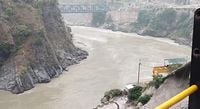On May 8, 2025, India opened three gates of the Salal Dam in Reasi District, Jammu and Kashmir, and two gates at the Baglihar Hydroelectric Power Project in Ramban. This decision, prompted by heavy rainfall across the region, aims to regulate rising water levels in the Chenab River. However, the move has raised serious concerns regarding potential flooding downstream in Pakistan, as the Chenab is a critical waterway for the country.
The controlled release of water from these dams is particularly sensitive, given the historical context of water-sharing agreements between India and Pakistan. The Indus Waters Treaty (IWT), which governs the distribution of river waters between the two nations, has recently been suspended following escalating tensions after a terrorist attack in Pahalgam, Jammu and Kashmir, that left 26 people dead, mostly tourists.
Indian officials stated that the opening of the dam gates was necessary to manage the pressure created by the heavy downpour, which has also led to flash floods and landslides in the Ramban district. The National Hydroelectric Power Corporation (NHPC) had previously closed all gates at the Baglihar and Salal dams on May 5, 2025, as a measure to control water flow, causing a significant drop in the water levels of the Chenab River.
Despite the urgent need to manage water levels, the Indian government opened the gates without formally notifying Pakistan. This lack of communication has been criticized, as it goes against the expected protocols under the IWT, which typically requires prior notification for any significant changes in water flow.
In a statement, Prime Minister Narendra Modi emphasized that the water from the rivers rightfully belongs to India, asserting, "Earlier, the water over which India had a rightful claim was flowing out. Now, it will flow, stay, and be used in India’s interest." This declaration reflects a significant shift in India's approach to water management, especially in light of recent military and diplomatic tensions with Pakistan.
The recent opening of the dam gates comes on the heels of "Operation Sindoor," a military operation conducted by India targeting terrorist camps in Pakistan. Following the Pahalgam attack, which was described as an 'act of war' by Pakistani officials, India executed precision strikes on nine terror camps in Pakistan, further escalating the already tense situation between the two nations.
As heavy rains continue to affect Jammu and Kashmir, the region is experiencing not only flooding but also disruptions to essential infrastructure. The Jammu-Srinagar National Highway has been closed due to mudslides and shooting stones, leaving numerous vehicles stranded. Officials have advised against travel on this critical route until conditions improve.
Pakistan has expressed concerns over India's unilateral actions regarding water management, particularly given the historical disputes surrounding the IWT. The Chenab River, a tributary of the Indus, is vital for Pakistan's agriculture, especially in the Punjab province, making the current situation particularly alarming for farmers and residents reliant on its waters.
Pakistan has previously sought World Bank arbitration over the construction of dams by India on the Chenab River, arguing that such projects violate the IWT. The Baglihar Dam, in particular, has been a contentious issue, with Pakistan demanding that India lower the dam's height to ensure adequate water flow into its territory.
As the situation develops, both governments are under pressure to manage not only the immediate impacts of the rainfall and flooding but also the broader implications of their water-sharing agreements. With the IWT now in abeyance, the potential for further conflict looms large as both nations navigate the complex interplay of military actions and diplomatic relations.
In light of these developments, the international community is closely monitoring the situation, as the consequences of unilateral water management decisions can have far-reaching effects on regional stability. The delicate balance of water rights and security in South Asia continues to be tested, with both India and Pakistan facing the challenge of addressing their respective national interests while avoiding escalation into broader conflict.
As India continues to manage its water resources amidst heavy rainfall, the implications for Pakistan remain a critical concern. The ongoing dialogue around the IWT and the recent military actions highlight the intricate relationship between water management and political tensions in the region. How both nations choose to navigate these challenges will be pivotal in shaping their future relations.


